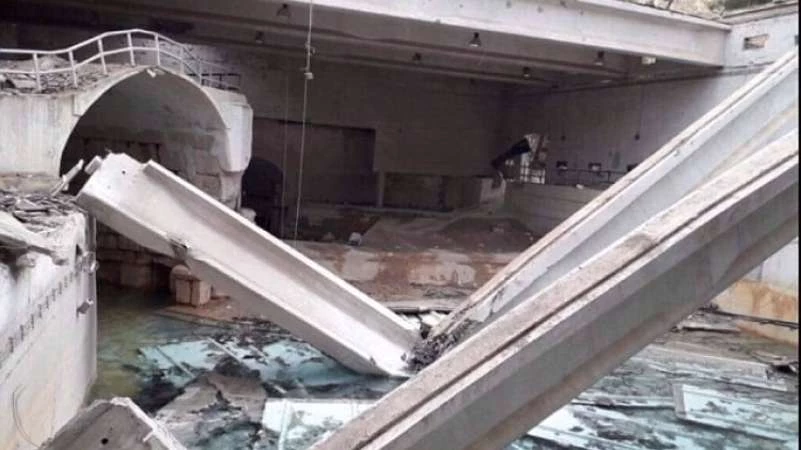The denial of the most basic human commodity—water—has been terrifying for a city shielded from much of the horrors of the six-year war.
The Assad regime’s "army" and their allies, fighters from the Iran-backed Lebanese group, Hezbollah, have launched barrel bombs into the Ain al-Fijah Spring that feeds the Barada River in the rebel-held area west of Damascus, poisoning the source of 70 percent of the city’s water supply. Life without water means panic for hospitals and homes. Housewives cannot cook or clean, doctors cannot work. The simplest things become impossible. Imagine not being able to turn on a tap and have water.
Watching this happen has been horrible, but I am one of the lucky ones. I fled the war in 2012, after being arrested for working as a journalist. I live in Europe now, I am safe, although I still miss my family and the life in the valley where I was born and raised.
It’s a beautiful place. When I was a little boy, I used to spend the summer holidays swimming in the Barada River. In my village in Wadi Barada, a valley northwest of Damascus, I built many houses with mud on the edges of brooks, collected blueberries and ran after dragonflies. Sometimes I used to help my father irrigate the fields where we grew beans and corn. Our walnut, sycamore and poplar trees that surrounded our fields seemed like titans protecting our family, our livelihood.
In the mid-1990s, water demand in Damascus outstripped the supply from Fijah Spring, which led the Assad regime authorities to drill a series of boreholes around the Barada Spring. This water flowed through the Fijah Spring into Damascus. I remember the large pipes that were laid along the riverbanks.
After that, the Barada River dried up. The uncontrolled growth of Damascus—which rose from 700,000 inhabitants in 1950 to 7 million in 2011—meant that the population needed more water than the spring could supply. Farmers left the barren land around the valley.
My grandmother told me that the people of Wadi Barada once owned the vast lands on top of all the hills. But in the mid-1970s, the Assad regime installed military bases there.
“I hope I won’t live till the day when they will attack us from there!” my grandmother said.
When I was a little boy, I once climbed a small mountain north of the valley to collect chamomile and thyme. Two Assad regime army soldiers found me there and beat me up. I had wandered into a military area.
Then the war started. As my grandmother had feared, we were attacked in 2011, at the start of the Syrian protests. The regime "forces" have been targeting Wadi Barada, where about 100,000 people still live, with barrel bombs, missiles and snipers. They have also partially blocked the roads to the valley and have made it hard for the United Nations and the Red Cross to enter the area.
Until recently, the rebel-held Ain al-Fijah Spring was not harmed. But the Damascus water supply was cut off every time the regime targeted the valley. By 2014, ISIS had arrived. They killed many civilians in the valley and the rebels who tried to defend the precious spring. Finally, in February 2016, the rebels drove ISIS out of the area. It was victory, of sorts, but the war between the rebels and the Assad regime "forces" continued.
On December 23, 2016, with no advance warning, the Assad regime’s "army," along with Hezbollah, began an assault on Wadi Barada. They said the area was a breeding ground for terrorists. But it is not only “terrorists” or fighters who reside in the valley. My mother also lives there.
The Assad regime has bombed the telecommunication, media and health-care centers. Assad-state media said the rebels poisoned Fijah Spring with diesel. Later, they changed their narrative and said the “terrorists” blew up the spring. But what I was told by friends, which now appears to be confirmed by local video footage, was that fighter jets bombed the spring.
Rebels say that because of the bombing, the spring’s water is now mixed with diesel, along with chlorine. They also say that the pumping system was severely damaged and the spring now empties into the Barada River.
The place where I played as a child has now become a symbol for the confusion of this war
On January 2, Syrian rebel groups froze talks with Russia and Turkey on their possible participation in Syrian peace negotiations—partially because of the violation of the cease-fire in Wadi Barada.
It’s winter now, and it’s cold in my hometown. People in the valley have been cutting down trees to heat their houses, since the regime has hardly allowed any diesel and cooking gas into the area since 2011.
Since the beginning of the attack on the valley, I have not been able to reach my family because the electricity and telecommunication have been cut off.
I miss my valley. I miss my mother. And I fear I may not get to see either of them ever again.



التعليقات (0)